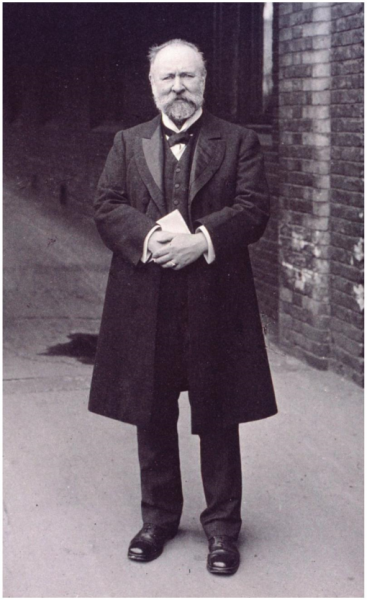Richard Bowdler Sharpe (RBS) is unquestionably the outstanding bird curator in the history of what are now the Natural History Museum (NHM) collections. Born on 22 November 1847, the son of the publisher of “Sharpe’s London Magazine”, he was a brilliant scholar with a deep love of natural history and when still young began to assemble a substantial bird skin collection. His father viewed these interests with disfavour and, on leaving school in 1863, RBS became a clerk at W.H. Smith, moving shortly thereafter to another bookseller, Bernard Quaritch. In 1867 he both married Emily Eliza Burrows (1843–1928), with whom he had ten daughters as well as one son who tragically died aged two, and also became the first librarian of the Zoological Society of London.
In September 1872, having already published two bird books and many research articles, RBS accepted a cut in salary to take up the post of Senior Assistant in the Department of Zoology of the British Museum, with special responsibility for the bird collection. With a single promotion in 1895, when he became Assistant Keeper of the Vertebrate Collection of the same department, he remained focused on the bird collections and research concerning them until his sudden death aged 62 on 25 December 1909. Over this period he completely transformed the state and status of ornithology at the museum: he oversaw a more than tenfold increase in the size (and importance) of the bird collection, from perhaps 30,000 to over half a million specimens; he was responsible for the production of the great “Catalogue of Birds in the British Museum” (1874–1898), which has been referred to as “the greatest work in the history of ornithology”, writing half of the 27 volumes himself and editing the remainder; and he wrote the 436 page chapter on “Birds” in volume II of “The History of the Collections Contained in the Natural History Departments of the British Museum” (1906), far longer and more detailed than all the other zoological (including entomological) accounts taken together. In addition, throughout his 37 years in post, he averaged over 10 research papers and monographs per year, the great majority collections based.
The museum bird collections meant everything to RBS; he devoted his life to them as ornithologists of the time recognised, despite for long struggling to support his large family on his low assistant’s salary. When A.O. Hume presented his collection of 90,000 bird specimens from the Indian sub-continent in 1885, the largest ever received by the museum, he was explicit that the presence of RBS was key to his decision and attempted (without success) to make it a condition of his donation that RBS, who travelled to India for three months to pack and ship it, should receive a salary increase! Outside the museum, RBS was immensely popular, being a member of numerous scientific societies in Britain and abroad, and an elected President at the International Ornithological Congresses in Budapest (1891), Paris (1901) and London (1905).
At the AGM of the British Ornithologists’ Union in May 1892, on whose committee he then served, RBS was one of five BOU members tasked with considering the proposition, probably originated by him, “that an Ornithological Club should be formed for the purpose of holding monthly meetings, at which papers should be read and specimens exhibited.” (Ibis 34(3): 476, 1892). The rest is history. This same group of five were appointed as the Committee of the BOC at its inaugural meeting on 5 Oct 1892, with RBS elected to be the editor of its Bulletin, a position he would hold until 1904.
Two quotes from RBS’s colleague and successor, W.R. Ogilvie-Grant, may serve to summarise his character: first, he could “testify to the fact that the increase and welfare of the Collections of Birds were always Dr Sharpe’s first thought, and …. when funds were not forthcoming for acquiring valuable specimens, [he] purchased them and gave them to the Museum.”; and second, “His immense and almost boyish enthusiasm never failed him to the end; … Kind-hearted almost to a fault, his unfailing courtesy, good temper, and readiness to assist all those who sought information and help endeared him to every one both at home and abroad. The cares of life, which in his case were many, and the deceitfulness of riches, which were few, hardly affected his exuberant spirits, and he was always cheery and full of good-natured chaff.” All subsequent NHM bird curators have stood in his shadow and wondered at his achievements.

Author Information
Robert Prŷs-Jones
